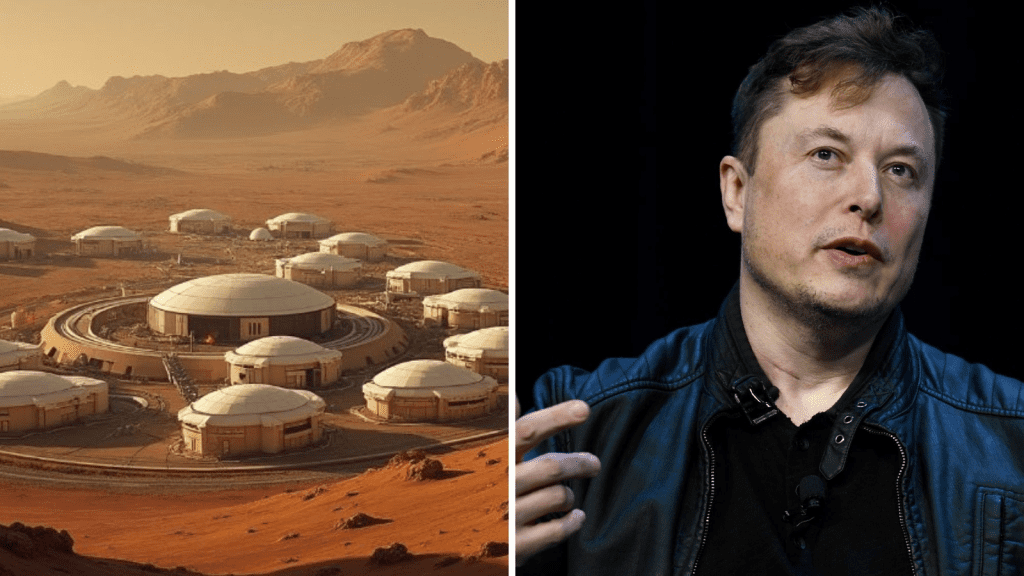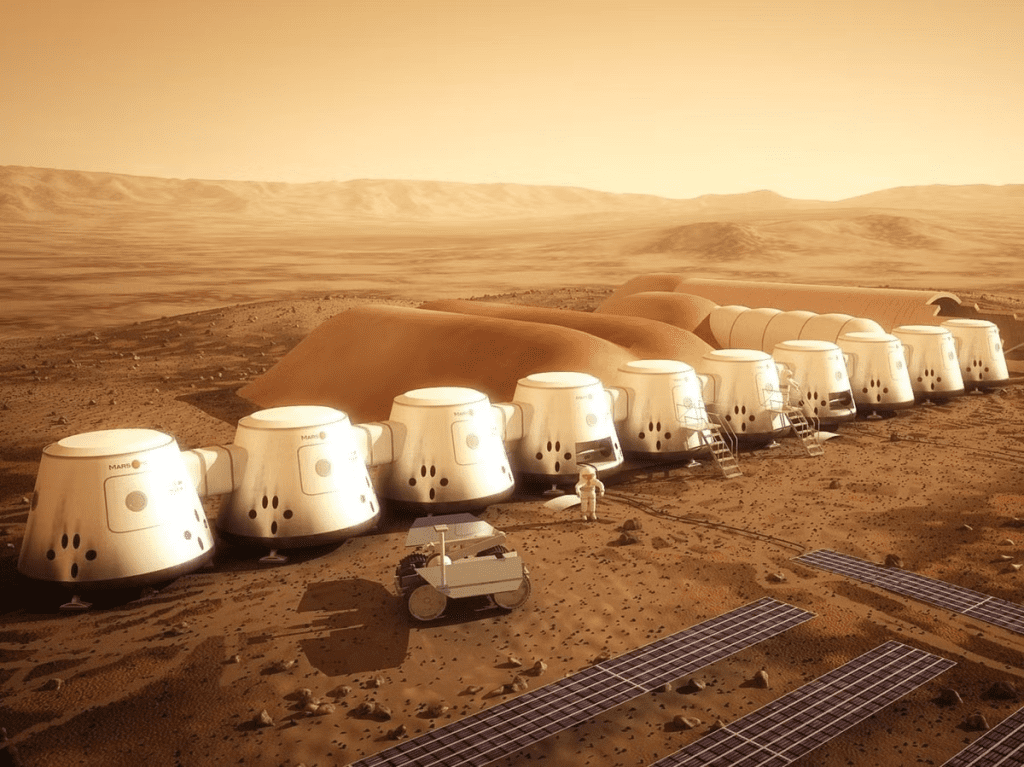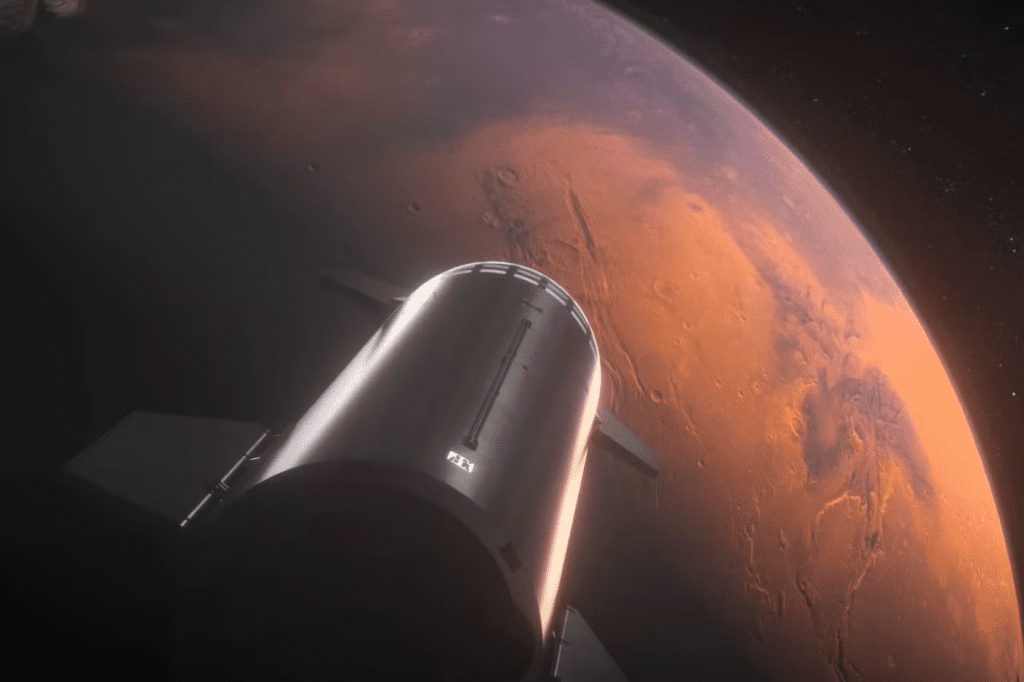Elon Musk, the founder of SpaceX and Tesla, has long been a visionary in the field of space exploration, and his latest venture may prove to be one of the most ambitious and revolutionary ideas to date. Rumors are circulating that Musk is preparing to launch a $50 billion real estate project on Mars, aimed at developing the first human settlements on the Red Planet.

While details remain scarce, the idea of establishing a human presence on Mars through a private real estate venture reflects Musk’s belief in humanity’s potential to become a multi-planetary species. The project, if true, could fundamentally alter the future of space exploration, technology, and even global economies.
The project, believed to be referred to as “Mars Real Estate,” reportedly involves the creation of sustainable human settlements on Mars, with a focus on constructing homes, habitats, and infrastructure necessary for long-term human survival.
Musk’s vision goes beyond merely sending astronauts to the Red Planet for temporary missions. Instead, he sees Mars as a new frontier for humanity, where private investors and pioneering companies will build the infrastructure needed to make the planet habitable. Musk is rumored to be using his position as the leader of SpaceX to gain the necessary resources, land rights, and technology for this massive venture.
According to sources close to Musk, the $50 billion project would involve a combination of private investments and partnerships. The idea is to create a self-sustaining, commercialized Martian settlement, with various investors contributing to the construction of space habitats, energy systems, and resource extraction facilities.

Musk’s goal is to establish a viable and profitable operation on Mars that would pave the way for further colonization efforts in the coming decades. The venture is expected to be a global collaboration, with major tech companies, private investors, and governments possibly being involved in the long-term funding and development.
Musk’s companies, SpaceX and Tesla, are already on the cutting edge of space and renewable energy technology, which makes him uniquely positioned to undertake such a project. SpaceX, in particular, has made significant strides in rocket technology, with the development of the Falcon Heavy and Starship vehicles—two crucial components that will be used for interplanetary travel and the transportation of materials to Mars.
Musk’s vision for this real estate project revolves around using these advanced technologies to transport materials, set up infrastructure, and bring in the necessary resources for Martian colonization. The fact that Musk’s team has already demonstrated the ability to launch reusable rockets and land them back on Earth provides a strong foundation for future missions to Mars.
A key component of the Mars Real Estate project will be securing the rights to land on Mars. While Musk and SpaceX are pioneers in private space exploration, the question of land ownership on Mars remains a complicated one. International laws, including the Outer Space Treaty, currently prohibit any nation or entity from claiming ownership of celestial bodies.
As a result, Musk’s plan will likely require negotiations with various international bodies, governments, and organizations to ensure that land rights on Mars can be secured for private development. SpaceX’s involvement will likely play a crucial role in these discussions, as the company will need to establish its own legal framework for operating on the planet and navigating the regulatory challenges of interplanetary real estate.

Despite the legal challenges, the potential rewards of such a venture are vast. The economic implications of Musk’s Mars real estate project are enormous. Not only would the development of Martian settlements provide new opportunities for investment, but it could also revolutionize industries such as construction, mining, energy production, and even space tourism.
The demand for resources on Mars, such as rare minerals, water, and energy, would drive significant economic activity, creating new markets and industries that have never before been imagined. Musk’s project could become the catalyst for the first interplanetary economy, one that relies on the extraction of resources from other planets to fuel Earth’s growth.
Private investors will likely play a major role in funding the Mars real estate venture, and Musk’s track record of attracting investment for his ventures suggests that this project will have no shortage of financial backing. The lure of being part of humanity’s first steps toward colonizing another planet is a powerful draw for venture capitalists, governments, and multinational corporations.
These investors would not only have the potential to profit from real estate and resource extraction on Mars, but they would also gain access to cutting-edge technologies that could be adapted for use on Earth. Musk’s ability to secure funding for such a massive project would be a testament to his reputation as one of the most innovative and ambitious entrepreneurs of the modern era.
While the prospect of interplanetary real estate raises exciting possibilities, it also presents a number of ethical and legal challenges. The question of who gets to own land on Mars and how the resources are distributed will undoubtedly be a source of contention. With the development of any new frontier, issues related to governance, ownership, and regulation will need to be carefully considered.

Musk’s Mars Real Estate project may also face environmental concerns, particularly regarding the impact that large-scale construction and resource extraction could have on the Martian environment. As with any ambitious project, the ethical and environmental implications will need to be addressed to ensure that the benefits of the venture outweigh the potential risks.
Musk’s drive to make humanity a multi-planetary species is rooted in his belief that humanity’s future lies in space. He has long argued that Earth is vulnerable to existential threats, and that the survival of the human race depends on our ability to become an interplanetary civilization.
The Mars Real Estate project is the latest expression of this vision, and it represents Musk’s determination to push the boundaries of what is possible. Just as he revolutionized the electric vehicle industry with Tesla and made space travel more accessible through SpaceX, Musk is now setting his sights on turning Mars into a viable home for humanity.
The Mars Real Estate project, if it comes to fruition, will mark a major milestone in the evolution of space exploration and human civilization. It is not just about building a new colony on another planet—it’s about securing humanity’s future. By using private capital to fund this project, Musk is taking a bold step toward ensuring that space exploration and colonization are not just for the elite or government agencies, but for everyone.

This move could open up entirely new frontiers for business, technology, and human progress. Whether or not Musk is successful, the very idea of a Mars Real Estate project is a bold declaration of humanity’s ambition to reach beyond Earth and build a future among the stars.
In conclusion, the $50 billion Mars Real Estate project is a groundbreaking venture that could reshape the future of space exploration and human civilization. Although the project is still in the early stages, the potential for success is immense, with Musk at the helm.
With SpaceX’s technology, private sector involvement, and Musk’s unrelenting vision, the idea of establishing human settlements on Mars may one day become a reality. As Musk continues to push the boundaries of space exploration and human achievement, the Mars Real Estate project stands as one of his most ambitious and transformative goals yet.


